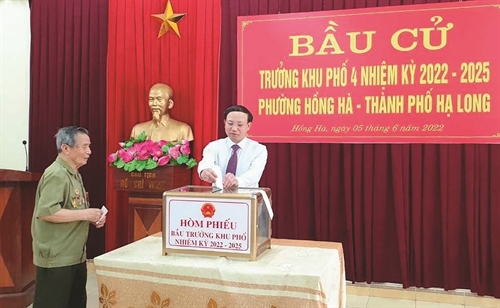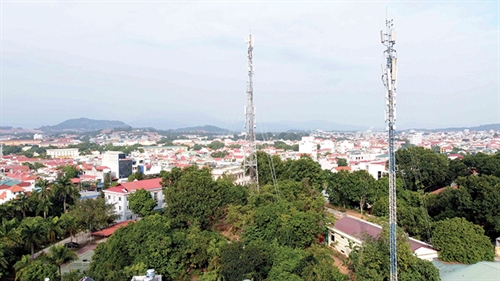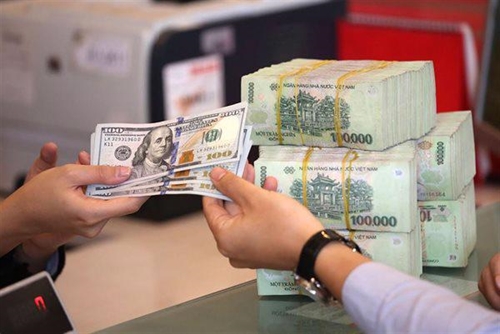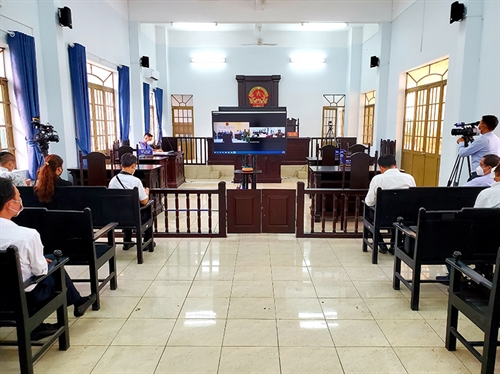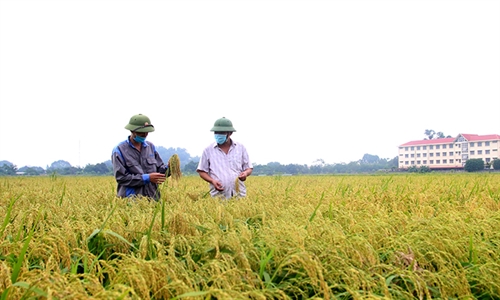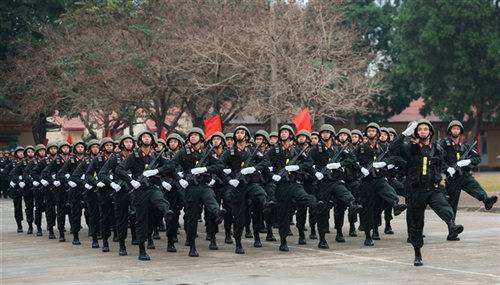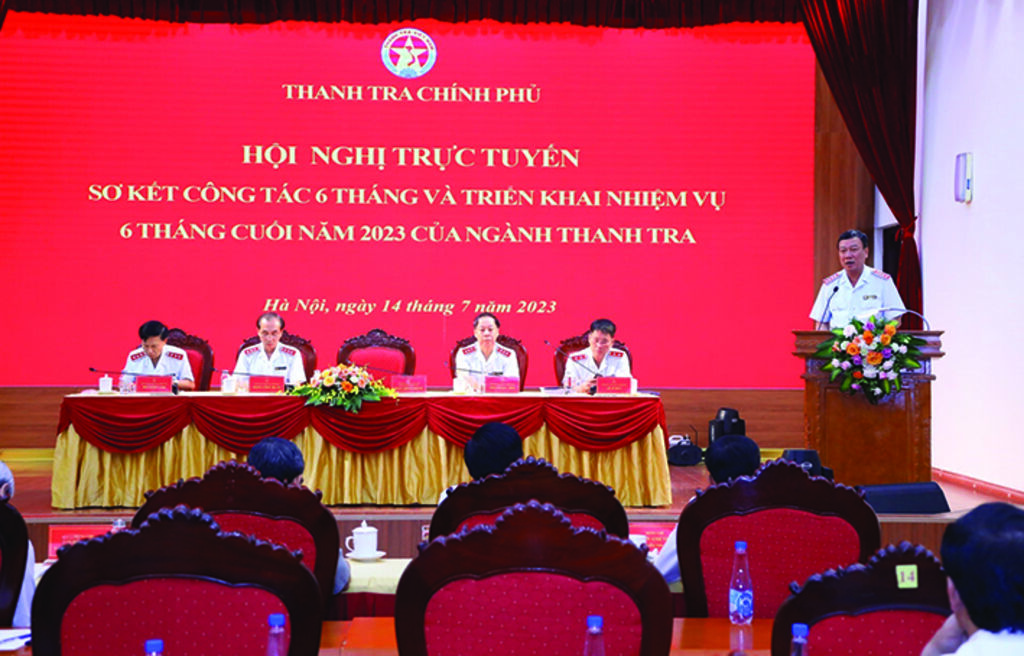 |
| Government Inspector-General Doan Hong Phong addresses a video conference on July 14__Photo: Van Diep/VNA |
Replacing its 2010 predecessor from the beginning of July this year, the 2022 Law on Inspection (the Law) provides for inspection organization and activities.
As per the Law, inspection covers activities of an agency performing the inspection function of reviewing, evaluating and handling according to the law-specified order and procedures the implementation of policies and laws, the performance of tasks and the exercise of powers by agencies, organizations and individuals. Inspection activities include administrative inspection and specialized inspection.
The Law, with one chapter and 40 articles added as compared to the 2010 version, contains salient new provisions.
Responsibilities of heads of state management agencies in inspection and examination
In order to ensure the effect and effectiveness of state management work, the Law requires heads of state management agencies to organize and direct inspection and examination activities. Also, they will be held responsible for regularly examining the performance of tasks and the exercise of powers by agencies, organizations and individuals under their management and the observance of policies and laws by agencies, organizations and individuals in sectors and fields falling under their management.
Noticeably, in the course of carrying out examination, the heads of state management authorities will apply or propose competent state agencies to apply the law-specified measures to promptly handle the violations they detect. In case of necessity, they will request or propose competent agencies to conduct inspection. If detecting signs of crime, they will propose initiation of criminal cases and forward the case files and relevant documents to investigation bodies for the latter to consider and decide on the initiation of criminal cases.
At the same time, the Law defines the responsibilities of the Prime Minister, ministers, heads of ministerial-level agencies, heads of government-attached agencies, chairpersons of provincial-level People’s Committees, heads of specialized agencies under provincial-level People’s Committees, chairpersons of district-level People’s Committees and heads of other state management agencies for organizing and directing inspection activities, and promptly handling conclusions and recommendations on inspection contents. They will bear responsibility before law for their decision.
Agencies performing the inspection function
Article 9 of the Law introduces inspection bodies classified by administrative level, inspection bodies classified by sector/field, inspection bodies in government-attached agencies, inspection bodies in the People’s Army, People’s Public Security Forces, State Bank of Vietnam and government cipher agencies, and agencies assigned to perform the specialized inspection function.
Specifically, inspection bodies classified by administrative level include the Government Inspectorate; inspectorates of provinces and centrally run cities; inspectorates of districts, towns, provincial cities and municipal cities; and inspection bodies in special administrative-economic units as provided by the National Assembly.
Meanwhile, inspection bodies classified by sector/field include inspectorates of ministries and ministerial-level agencies; inspectorates of General Departments/Directorates or Departments/Authorities/Agencies/Administrations under Ministries and the equivalent; and inspectorates of provincial-level Departments.
One of the prominent changes is that the Law permits general departments/departments under ministries to establish inspectorates to perform specialized inspection tasks under their state management and receive citizens, settle complaints and denunciations and prevent and combat corruption and negative practices.
Moreover, provincial-level People’s Committees will also be empowered to set up provincial-level department inspectorates to meet state management requirements in their localities, based on state payrolls assigned to local administrations.
Inspection activities
With a view to making inspection activities professional and distinguishing between inspection and examination, the Law abolishes the form of regular inspection specified in the 2010 Law, and keeps two forms of inspection, namely scheduled inspection and unscheduled inspection.
According to Article 46 of the Law, scheduled inspection will be conducted under issued inspection plans, while unscheduled inspection will be performed upon detection of signs of violation committed by agencies, organizations and individuals or to meet requirements of the settlement of complaints or denunciations, prevention and combat of corruption and negative practices or as assigned by heads of state management authorities.
The Law specifically stipulates the duration of an inspection (Article 47) and adds provisions on the extension of inspection duration (Article 48), suspension of an inspection (Article 70), and termination of an inspection (Article 71).
As per the order and procedures for conducting an administrative inspection or a specialized inspection, Articles 49 and 50 specify three steps: inspection preparation, performance of direct inspection, and completion of the inspection. Unlike the 2010 Law, the jobs of the inspection preparation step are introduced in the Law to ensure that the inspection is conducted within the law-prescribed time limit while minimizing its impacts on the normal operation of the inspected subjects.
Worthy of note, Article 78.1 of the Law sets a specific time limit for issuance of inspection conclusions. Accordingly, within 15 days after receiving draft inspection conclusions, inspection decision issuers have to sign such inspection conclusions and take responsibility for their conclusions.
For the purpose of avoiding overlaps or duplications in inspection activities, the Law states that each ministry or province will draw up its own inspection plans. If detecting overlaps or duplications, inspection agencies must exchange opinions with one another to reach agreement on handling thereof. In the absence of such agreement, superior inspection agencies will conduct inspection.
The Law asks for coordination among inspection agencies and state audit offices in exchanging information right from the formulation of inspection and audit plans, performance of inspection and audit activities, and use of inspection and audit results.
Another notable change is that the Law removes the 2010 version’s provisions on People’s Inspection Boards, which are now included in the 2022 Law on the Implementation of Grassroots Democracy.
Prohibited acts in inspection activities
According to Article 8 of the Law, the following acts are prohibited in inspection activities:
- Abusing inspection positions and powers to commit illegal acts, harass for bribes, or cause difficulties or troubles to, inspected subjects and other agencies, organizations and individuals; abusing powers in the course of inspection;
- Conducting inspection ultra vires or in contravention of inspection decisions or approved plans;
- Intentionally failing to issue inspection decisions upon detection of signs of violation which are subject to inspection; covering up inspected subjects; intentionally making false conclusions; illegally making conclusions or decisions or taking handling measures; failing to propose criminal case initiation and forward files of cases showing signs of crime detected through inspection to investigation bodies for the latter to consider and decide on criminal case initiation;
- Giving bribes, receiving bribes or brokering bribes;
- Disclosing information and documents related to an inspection when the inspection conclusion has not been made public;
- Illegally interfering in inspection activities; using influence to falsify inspection results, conclusions or recommendations;
- Failing to provide information and documents or providing information and documents in an untimely, incomplete, untruthful or inaccurate manner; appropriating or destroying documents and evidences related to inspection contents; and,
- Opposing, obstructing, bribing, threatening, retaliating against, or suppressing persons conducting inspection, persons performing supervision, persons performing appraisal, or persons providing information and documents to agencies performing the inspection function, thus obstructing inspection activities.-

